Apricots, the wonder fruit
by Crenguţa Roşu
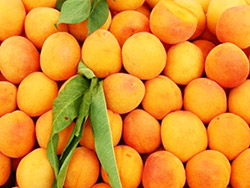 A small fuzzy fruit that seems to contain all the warmth and the heat of the sun, the nectarous apricots belong to an ancient tradition in healthcare and beauty.
A small fuzzy fruit that seems to contain all the warmth and the heat of the sun, the nectarous apricots belong to an ancient tradition in healthcare and beauty.
Archeological discoveries reveal the fact that this wonder fruit was known in India and China over 5000 years ago. With their gold velvet skin, sweet, with an attractive, unique flavor, apricots have been associated with divine attributes, considered to be “the nectar of the gods”. It was thought that those who eat this blessed fruit will be endowed with a young and vigorous body and an agile mind until their old age. A few millennia later, scientific studies will have fully proven all these benefic effects of theirs.
All apricot assortments, about 300 of them in the entire world, including the Romanian types (such as the well known Mirabelle plum, smaller than apricots, with a freckled and reddish peel, extremely flavored and sweet as honey) have powerful health supporting properties that we can fully benefit from, on one condition: to know how to make use of them. To those interested in making use of the recommendations in this article, we insist of reading the precautions and contraindications mentioned in the end.
How apricots should be consumed, in order to benefit from their therapeutic effects
There are some healing substances to be found in the wondrous apricots, such as the orange pigments. These also have a very strong anti-oxidant effect. They can be found both in fresh apricots and in the ones dried under direct sunlight (or artificially, in low temperatures) and, to a smaller extent, in frozen apricots, but not in thermally prepared apricots, with temperatures higher than 60 degrees Celsius. Thus, in order to get the desired therapeutic effects, we will focus on eating the fruit raw, due to the fact that cooked version lacks the therapeutic virtues.
The minimum daily dosage recommended by nutritionists, is 350 grams a day. But for astonishing results, we will need a diet that will be described next.
The apricot diet
 For the apricot diet, you should eat anywhere between half a kilo and a kilo of apricots in total, approximately thirty minutes before the main meals of the day. The fruit should be thoroughly washed; the spoiled parts or the parts that have already started to ferment should be removed (to avoid causing any gastro-intestinal disorders). An apricot diet lasts at least 14 days up to a month and a half at most, but most of the times, it is limited by the periods in which it is possible to find these fruits fresh, a period which is no longer than eight weeks.
For the apricot diet, you should eat anywhere between half a kilo and a kilo of apricots in total, approximately thirty minutes before the main meals of the day. The fruit should be thoroughly washed; the spoiled parts or the parts that have already started to ferment should be removed (to avoid causing any gastro-intestinal disorders). An apricot diet lasts at least 14 days up to a month and a half at most, but most of the times, it is limited by the periods in which it is possible to find these fruits fresh, a period which is no longer than eight weeks.
Dried apricots
Dried apricots can be obtained at home by drying them in special electrical driers (which can be purchased in large electric appliances stores), or in the electric oven, set for 50 degrees Celsius, at most. This is due to the fact that the drying process should be a fast process so that the fruit won’t start fermenting. A temperature that will not destroy the active factors is also mandatory.
In Greece or Turkey, where the sun is extremely generous and rain is almost absent during summer, drying apricots in the sun is a millenary tradition. Through the process of dehydration, apricots will basically lose all their water they contain, gaining the aspect and consistence of a raisin. At this point, the dehydration process is over and the fruit will be stored in paper bags and kept in dark, cold places.
Dried apricots that can be found in stores are, unfortunately, chemically enhanced for conservation. When consuming them, they generate a toxin, therefore it’s best to avoid them.
Apricots are so beneficial for man that they were entitled: “health gold”
The anti-cancer properties of apricots
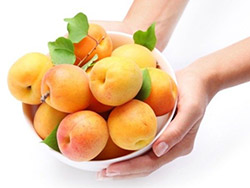 As well as most fruit, apricots are consisting of a large amount of anti-oxidants, which helps fight the degenerative effects of the free radicals. This way, the anti-oxidants are protecting the cells of the organism from their potential cancerous transformation.
As well as most fruit, apricots are consisting of a large amount of anti-oxidants, which helps fight the degenerative effects of the free radicals. This way, the anti-oxidants are protecting the cells of the organism from their potential cancerous transformation.
Preventing prostate cancer – lycopene is one of the pigments that give the wonderful yellow-orange colour of the apricot, it is one of the strongest substances that help preventing cancer. A study conducted in China in the year 2007 has revealed the amazing effects of preventing prostate cancer through a particular combination consisting of green tea (Thea sinensis) and apricot lycopene.
An aid in fighting breast cancer – amygdalin, also known as vitamin B17 (even if it is not exactly a vitamin), from the apricot seeds is considered to be one of the strongest anti-tumor agents and it is one of science’s big hopes in fighting cancer. This vitamin balances the activity of the gonads, it destroys cancer cells and stimulates the immune system into eliminating them from the organism. Therapeutically, one should eat 10 apricot seeds daily, on a 30 day period, followed by a 15-30 days break and then the treatment can be restarted.
Pulmonary cancer adjuvant – the same treatment is applied in the same of breast cancer, the amygdalin in the apricot seed will act directly upon malignant cells, causing their destruction. A major cause of this form of cancer is smoking. The daily consumption of apricots, 500 grams a day is recommended for the prevention and elimination of its harmful effects. Being very rich in vitamins A and C and lycopene, apricots are an excellent remedy for smoking. They are particularly recommended to women who used to smoke and are now about to become mothers and need a quick detoxifying treatment. To emphasize the benefic effect of the apricot diet, the persons who used to smoke should also consume zeolite or green celery such as parsley, ramson, dill, lovage, in order to eliminate heavy metals and other toxins brought by cigarette smoke in the organism.
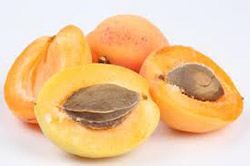 Colon cancer adjuvant – an experimental medicine study conducted in Belgium in 2002 has shown that an apricot extract can inhibit tumor development at the level of the colon. Prior studies have shown that pectin, a soluble food fiber which exists in fresh apricots, is one of the best prophylactic agents for colon cancer. Therefore, consuming fresh apricots is proper in the case of colon cancer, either eating them or making juice, or even eating the core of their seeds – 5 to ten each day.
Colon cancer adjuvant – an experimental medicine study conducted in Belgium in 2002 has shown that an apricot extract can inhibit tumor development at the level of the colon. Prior studies have shown that pectin, a soluble food fiber which exists in fresh apricots, is one of the best prophylactic agents for colon cancer. Therefore, consuming fresh apricots is proper in the case of colon cancer, either eating them or making juice, or even eating the core of their seeds – 5 to ten each day.
By eating apricots we can prevent:
Heart failure and infarctions – the lycopene contained by apricots, but other active substances as well, such as vitamins A and C, potassium, etc. are protecting the heart and blood vessels, preventing such affections. In Europe, researchers have discovered that the lycopene in apricots, as well as other active substances are preventing cholesterol oxidation and its sedimentation on coronary arteries, thus lowering the risk of heart failure.
Macular degeneration – a study conducted on a great number of people (approximately 50.000) has shown that a massive amount of vitamin A, obtained from natural ingredients, will decrease the risk of macular degeneration by no less than 40%. Apricots are one of the fruit containing most vitamin A, the only fruit containing more vitamin A than apricots is the sea buckthorn.
Bronchitis, asthma, tuberculosis – twice a year, one will start a diet with apricot seed cores, a treatment which will have an exceptional immune-stimulating and immune-modulating effect, preventing the occurrence of such affections. You should eat five such seed cores every day, in the morning, at breakfast, for 60 days. Usually, there should be a 60 day break between two diets. The basic consumption of apricots also has its anti-inflammatory and anti-oxidation effects, preventing asthma and chronic pulmonary conditions.
Apricot internal treatments
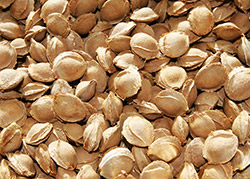 For memory loss conditions – apricot seeds are recommended, 5 to 10 each day, in two week diets, followed by two weeks break. These contain, among others, lecithin and acetylcholine – two substances which are very valuable for memory processes that take place in the brain. Research has shown that the core of the seeds of apricots also contains a cocktail of vitamins from the B complex of vitamins and amygdaline (also known as laetrile), a cocktail which is considered to be one of the strongest anti-oxidation known agents, which prevents degenerative processes at the level of the brain, which occur in Alzheimer’s disease.
For memory loss conditions – apricot seeds are recommended, 5 to 10 each day, in two week diets, followed by two weeks break. These contain, among others, lecithin and acetylcholine – two substances which are very valuable for memory processes that take place in the brain. Research has shown that the core of the seeds of apricots also contains a cocktail of vitamins from the B complex of vitamins and amygdaline (also known as laetrile), a cocktail which is considered to be one of the strongest anti-oxidation known agents, which prevents degenerative processes at the level of the brain, which occur in Alzheimer’s disease.
Ocular fatigue, loss of visual acuity – one should eat fresh apricots, 500 grams per day, in diet periods of at least six weeks. Due to their high amount of beta-carotene/vitamin A, apricots help maintain visual keenness, protecting the eyes from a series of other conditions, such as cataract or glaucoma, as well as nyctalopia (night blindness).
In the case of high cholesterol and increased triglyceride levels – diets of at least four weeks are recommended; dosage is half a kilogram, up to a kilogram of apricots per day. The fibers in apricots prevent the assimilation of saturated fats, while the increased infusion of beta-carotene and lycopene protects LDL cholesterol from oxidation and sedimentation on the walls of the blood vessels. Scientific studies have proven that the risk of the so-called metabolic syndrome decreases, as a consequence of apricot consumption. This risk includes hypercholesterolemia, arterial hypertension, early onset diabetes and abdominal obesity.
Efficient in the treatment of gout – 600 to 800 grams of fresh apricots should be consumed on a daily basis, for a minimum period of 30 days. It’s a simple cure, but one which jumpstarts the salts of the uric acid in the tissues and helps eliminating them through urine. In addition, through its inflammatory effect, the apricot cure helps lowering the frequency of occurrence of gout crises, until completely eliminating them and regaining the normal aspect and mobility of affected articulations.
Constipation and body weight balancing – due to their high content of cellulose and pectin (food fibers) of apricots, these are often used as laxatives. Cellulose and pectin are indigestible edible substances which act at the level of the lower intestines as a piston, pushing all the residues out of it. Also, sorbitol, a natural sugar contained in apricots gives them additional laxative properties. A two week treatment consisting of 500-800 grams of apricots per day, each morning, before breakfast, is recommended, and additionally, one liter of water. Apricots are the best friends of a proper silhouette. Their efficiency in weight loss diets is not only caused by their rich fiber content, but also to the few calories they have. And the high amount of nutrients (almost 80 of them) satisfies our appetite.
Biliary lithiasis adjuvant and liver beneficial – In European folk medicine, a very often used cure against microlithiasis and biliray lithiasis is the consumption of apricots and their seed cores. Each morning, before breakfast, one should eat 12 seed cores and then wait for an hour. During the day, 500-600 grams of fresh, sweet-sour apricots are to be consumed. These have a choleretic effect (help evacuate bile into the cholecyst) and dissolve the biliary calculi. Apricots stimulate liver regeneration and the functions of hepatic cells, helping the natural detoxification of this organ. Thus, they are recommended for those who suffer from different hepatic affections: hepatic steatosis or fat liver, toxic or viral types of hepatitis, fatigue, etc.
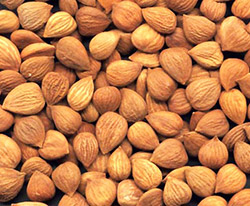 Efficient in
Efficient in
treating cystitis – the anti-infectious effects of fresh apricots are modest, but, they are also especially recommended against renal-urinary infections, due to them causing an alkaline infection inside the organism, contributing in turning the urine alkaline. Synthesis antibiotics, as well as natural anti-bacteria substances (such as bear’s grapes, blueberry leaves, cranberry leaves, etc.) become active and able to exercise their anti-infectious function only when the pH of the urine is alkaline. Therefore, during cystitis, nephritis, pielonephritis treatments, eat at least a half a kilogram of apricots a day, but avoid meat, canned products, excess proteins.
Fever, infectious disease and fever – fresh apricot juices (obtained by mixing them in a blender) are an authentic natural tonic, when used by those who suffer from fever or inflammatory symptoms (including cutaneously). Apricot juice, mixed with a little bit of honey and eventually, a fresh mint leave, is very refreshing for those with a high fever, and it is also an aid for the cardio-vascular system, which is under a great deal of stress when the body temperature’s going over 38.5 degrees Celsius.
It revigorates us in hot summer days – calcium, iron and the water found in apricots contribute to the prevention of sickness and all sorts of imbalances that take place in the organism, especially during the summer, due to the excessive heat. The ethers present in the peel of the apricots raise the brain’s resistance to stress, high temperatures and they prevent us from fainting in hot summer days.
Stimulating growth processes in children – fresh mashed apricots are some of the first fruits that can be consumed by infants, when their food range is starting to diversify. They stimulate normal bone development and the immune system; they protect them from indigestion and constipation. That’s why, during the summer, fresh apricots should be a part of their diet.
They prevent premature aging processes – especially the seed cores, but fresh apricots as well. They help keeping the nervous system young, by protecting especially the memory. More studies conducted on the cores of this fruit have shown they are amongst the strongest aliments that can stop and even “reverse” the aging processes. Also, they help keeping the digestive system and blood vessels healthy, and a good muscular tonus. During the summer apricot season, treatments of up to four weeks are recommended, during which a half a kilogram of apricots should be eaten a day, as well as five to eight seed cores.
 They represent a potent cure for anemia – apricots contain large amounts of iron and vitamin A, therefore they are recommended to children with rachitis and teenagers having growth problems, as well as to those who suffer from feriprive anemia. In these cases, the diet should last a month, in order to get some visible results. Feriprive anemia – which consists of an iron deficiency, is considered to be the most frequent form of anemia. Through constant consumption of apricots, haematopoiesis is stimulated, which is the production of hemoglobin which is responsible for the transportation of oxygen throughout the body. Additionally, iron helps the development of the cells and the improving of the immune system. You can eat apricots whether you’re feeling tired or your organism is subjected to sudden changes in temperature.
They represent a potent cure for anemia – apricots contain large amounts of iron and vitamin A, therefore they are recommended to children with rachitis and teenagers having growth problems, as well as to those who suffer from feriprive anemia. In these cases, the diet should last a month, in order to get some visible results. Feriprive anemia – which consists of an iron deficiency, is considered to be the most frequent form of anemia. Through constant consumption of apricots, haematopoiesis is stimulated, which is the production of hemoglobin which is responsible for the transportation of oxygen throughout the body. Additionally, iron helps the development of the cells and the improving of the immune system. You can eat apricots whether you’re feeling tired or your organism is subjected to sudden changes in temperature.
The high levels of vitamin C in the apricots (700 grams of apricots contain approximately 130% of the vitamin C needed by an adult person) is extremely favorable in conditions such as allergies, asthma, respiratory viroses, affections with fever and inflammation as symptoms, in general.
Apricots also contain potassium, which has a positive effect in decreasing blood pressure. They also help maintaining the optimum level of fluids; support the body’s own metabolism and muscular functions.
Benefits on beauty
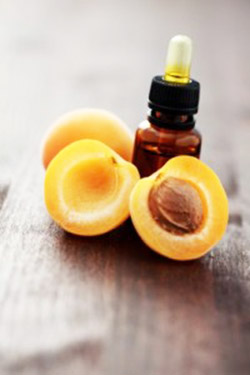 Apricots are also considered to be a fruit of beauty, due to the large amount of vitamin A and E they contain, in addition to the essential fat acids. After sea buckthorn, the absolute champion when it comes to vitamin A, apricots contain the largest amount of vitamin A (actually, it’s provitamin A, that the human body will transform into vitamin A, through digestive processes). A single apricot will give us 20% of the daily amount needed by an adult for cell growth and development, maintaining a healthy skin, hair and nails, as well as bones, teeth and gums.
Apricots are also considered to be a fruit of beauty, due to the large amount of vitamin A and E they contain, in addition to the essential fat acids. After sea buckthorn, the absolute champion when it comes to vitamin A, apricots contain the largest amount of vitamin A (actually, it’s provitamin A, that the human body will transform into vitamin A, through digestive processes). A single apricot will give us 20% of the daily amount needed by an adult for cell growth and development, maintaining a healthy skin, hair and nails, as well as bones, teeth and gums.
Apricots are very efficient in treating:
Fat, seborrheic skin – a massage using the ripe apricot pulp is recommended on the skin. The skin should be previously cleaned with warm water. This process should be repeated daily, causing the skin to become clearer, brighter and more elastic. In addition, eating about a half a kilo of apricots each day is also recommended, for their purifying, laxative effect.
For an aged skin – a cosmetic mask made out of three ripe apricots is recommended. Mix the fruits in a blender, add a spoon full of sour cream and a spoon full of liquid honey and mix them up. The resulting mass should be spread on the previously cleaned skin. Let it do its job for 10-12 minutes, then wash your face with warm water.
Sunburns – the juice from 2-3 ripe apricots ought to be applied on the burns caused by prolonged sun exposure. This remedy will act very effectively, thus calming the inflammation and stingy sensation and healing the damaged epidermis.
Precautions contraindications for apricot treatment
Fresh apricots are very well tolerated by the organism and have no adverse reactions. They should be administered cautiously, in small dosages at first, only in cases of fermentation colitis, acute or chronic diarrhea, hyperacid gastritis, in order to avoid worsening these digestive conditions.
 Apricot seeds, on the other hand, contain small quantities of cyanide which, in large quantities can induce lethal intoxications. In professional literature, it is stated that an amount of 50-60 seed cores, if ingested, can put a grown man into a state of coma, and even cause death. Accidents of such kind were never encountered in recorded history. Still, we recommend respecting the daily dosages of apricot seed cores for grown-ups, and 6 year old or younger children should not eat more than two such seed cores daily.
Apricot seeds, on the other hand, contain small quantities of cyanide which, in large quantities can induce lethal intoxications. In professional literature, it is stated that an amount of 50-60 seed cores, if ingested, can put a grown man into a state of coma, and even cause death. Accidents of such kind were never encountered in recorded history. Still, we recommend respecting the daily dosages of apricot seed cores for grown-ups, and 6 year old or younger children should not eat more than two such seed cores daily.
yogaesoteric
July 25, 2014
Also available in:
 Română
Română
